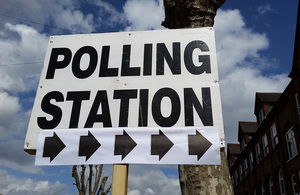Thank you Mr Chair.
I am grateful to Ambassador Çevik for briefing the Permanent Council this morning. I would ask him to pass on the United Kingdom’s heartfelt thanks to all his staff – both international and Ukrainian Mission Members – for everything they have done and continue to do for us. The experience, the expertise and the contacts built up by the Special Monitoring Mission over the last eight years remain invaluable. I would also like to take this opportunity to offer my personal condolences and those of my delegation for the death of Maryna Fenina – she, together with all Ukrainian victims of Russian aggression, remains in our thoughts.
Mr Chair, today we mark one month of President Putin’s war of choice against Ukraine.
One month ago in the early hours of Thursday the 24th February, the world woke up to bombs falling on Ukrainian cities and the news that Russia had launched a premeditated, unprovoked and entirely unjustified invasion of its sovereign, democratic neighbour. That same day my Foreign Minister joined dozens of others in this very council, condemning Russia’s violation of the most basic principles of the UN Charter and international law, as well as their flagrant disregard for OSCE principles and commitments.
The Russian government claimed to be acting in pursuit of peace. In reality, they started a war of aggression.
Sadly, in the days that followed, Russia’s disregard for international humanitarian law and their willingness to indiscriminately attack civilian areas became crystal clear. Civilian casualties grew rapidly as reports came in of the Russian military bombing apartment blocks, schools and hospitals in Kyiv, Kharkiv, Sumy, Chernihiv, Mariupol and many other places.
The Russian government claimed falsely to be acting to protect people in Donetsk and Luhansk regions – instead they unleashed hell on the people of Mariupol and on towns and cities throughout Ukraine.
In an effort to stop the bloodshed, on the 27th February 45 OSCE participating States, including the UK and OSCE chair Poland, called on the Russian government to implement a humanitarian ceasefire. Shamefully, not only was that call ignored, but evidence emerged of Russia targeting agreed evacuation corridors – attacking civilians at their most vulnerable as they attempted to flee for safety.
The Russian government claimed to be respecting international humanitarian law – instead they committed atrocities against civilians.
As Russia’s war of aggression dragged on, we saw yet further evidence of Russia’s irresponsibility and their willingness to endanger not only Ukrainians but people all across Europe. Russia occupied the Chernobyl nuclear power plant – interfering with the vital work of Ukrainian staff keeping the site safe and preventing them from being relieved by their co-workers for days. The Russian government became the first State to attack a functioning nuclear power plant when they shelled Europe’s largest nuclear power station in Zaporizhia.
Mr Chair, sadly these are just some of the many heinous acts perpetrated by the Russian government that we have been forced to confront in the last month. There were many others I could have named.
The Russian delegation can continue to attempt to distract and deflect us from their government’s actions. But this is futile. No one believes them.
Instead, our colleagues should consider what it is they are defending and advise their government in Moscow that it will never succeed – neither in President Putin’s senseless war, nor in its attempts to spread disinformation about that war.
So, Mr Chair, what should the Russian government do? No, what must the Russian government do?
They must respect international humanitarian law:
-
Civilians must be allowed to evacuate in the direction of their choosing – not be forcibly deported to Russia as shockingly is now being reported.
-
International organisations, including the OSCE, must be granted safe passage throughout Ukraine. Russia must allow the delivery of humanitarian aid.
-
Russia must stop targeting civilians and civilian areas – international humanitarian law is unbending and indisputable in this area.
Mr Chair, the above steps from Russia are urgently needed for humanitarian reasons, but they would no longer be necessary if Russia simply immediately ended this senseless war. This is a war that the Russian government chose to start, in violation of international law, they can and must respect international law and end it.
Finally, Mr Chair, Russia must return to respect for the OSCE principles and commitments that keep us all safe. They must respect the sovereignty and territorial integrity of their neighbour Ukraine. They must withdraw all their troops and return all Ukrainian territory to the rightful control of the Ukrainian government, including Crimea and the Donetsk and Luhansk regions of Ukraine.
The Russian government has made itself an international pariah through its own actions – the longer they persist in this war of choice, the longer they will remain a pariah.
Thank you Mr Chair and I request that this statement be attached to the journal of the day.


